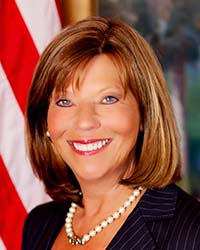We are different
Excerpted from an address to the annual meeting of electric cooperatives, February 23, 2015.
By Jo Ann Emerson I still hear those old questions: Why do electric cooperatives still exist? Wouldn’t it make more sense for them to merge with other utilities? Couldn’t they change their member-owned model?
I still hear those old questions: Why do electric cooperatives still exist? Wouldn’t it make more sense for them to merge with other utilities? Couldn’t they change their member-owned model?
I turn those questions around. I want to know: Why do investor-owned utilities have more to do with investors than consumers? Why are their customer satisfaction scores lower? Why don’t they treat their business like it belongs to the rate-payers?
So the question isn’t, “Why do electric cooperatives still exist?” The question is, “Why do business any other way?”
We are partners with the people we serve. While others may be afraid of what their customers might say to them, we listen to our members. Commitment, engagement, cooperation — they are the keys to our success.
Cooperatives are committed to communities. Electric co-ops bring millions, even billions of dollars to their states. You employ thousands of people. You support tens of thousands of jobs in the community, and you do things other utilities won’t. You keep your members’ money in the local economy. You partner in community economic planning. You pick up the telephone when a member needs you, and you probably call them by their first name.
That is the cooperative difference. We are committed to our members.
So let us, together, set a different direction. Different from partisan politics. Different from mega-utilities.
No matter where you are in the country, no matter how big or small, no matter what kind of fuel you use or generate — let’s put the cooperative difference at the center of our mission.
Our electric cooperatives will have over 14,000 jobs to fill in the next five years. And about 160,000 active duty U.S. service members transition out of the military every year. Many of them will return to our communities as veterans. When they come home looking for a job, let’s be sure that the cooperative is the one phone call our veterans know they can make. Give them guidance — and confidence — as they transition back into civilian life. Let it be known: Co-ops. Hire. Veterans.
Let’s embrace technology and make cooperatives the model for deployment of new ideas. Let’s give co-op members the technologies and information they need to manage their energy usage.
Let’s look for the root causes of poverty in our communities and address those challenges with direct action and civic engagement. The electric cooperative is a powerful force for change in the community.
Think about the hundreds of cooperatives working for charitable causes through Operation Round-Up. Let us lead our communities with compassion.
And let us look for opportunities to make a difference in the world. Let’s look to the 1.5 billion people without electricity. Let us expand our model for international service — to bring freedom and opportunity to communities that have never known either. Reliable electricity is the foundation upon which to build sustainable communities: new businesses, new schools, better health care and a better life. And the cooperative model works in ways other models don’t: a government doesn’t choose it, an official “planner” doesn’t choose it, the people choose it.
If you can’t tell, my energy and enthusiasm haven’t faded — not one bit. They’ve grown. There will always be power and there will always be politics. But for communities to prosper, they need people — good, strong people, like you — leading them, fighting for them, sticking by them, speaking up for them, and rolling up your sleeves with them. You are those people. You make the difference.
About the Author
Jo Ann Emerson became the fifth CEO of the National Rural Electric Cooperative Association in March 2013.-
Share this story:

